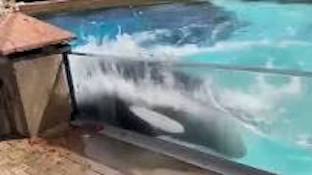If we in Canada are to maintain any kind of credibility out in the wider world of animal welfare activism, we will have to move quickly to get our own house in order. We’ve long known about conditions at Marineland Niagara Falls, but what’s been so graphically illustrated in recent days has cast a blazing spotlight on injustice which is impossible for anyone to miss. We have to make this right, or any claims Canada might have to being considered a compassionate society will seem farcical.
Kiska, the park’s lone orca, has lived alone in her concrete tank since 2011. Recently, her mental state has been visibly deteriorating. She appears to be getting increasingly desperate as the accumulated effects of isolation have taken their toll. Footage captured by anti-captivity activist and former trainer Phil Demers clearly shows her thrashing against the side of her tank. The videos show the awful scene from two different angles, and have been viewed countless times on social media. Graphically depicted is an individual in extreme distress engaging in self-harming behaviour. Nothing could be more obvious to anyone who has viewed either of these clips.
My anger and frustration with this situation resulted in our decision to speak out on this point this week. Part 2 of Waging War on Captivity will post in a few days. For now, we need to turn our attention to this most urgent matter.
In my inbox this morning was a message from World Animal Protection – a terrific organization we’ve cited many times, and who deserve our continued support for the excellent work they do. Today’s message was a reminder that animals in this country need our voice in our coming federal election. Absolutely true. And I welcome the help WAP provides to the public in harnessing our power as voters.
Included in the email was this line, about which I’d like to make one minor but important objection. “[We’ve] asked five political parties to commit to addressing the two biggest animal welfare issues of our time: ending intensive animal agriculture and curbing the commercial wildlife trade”. Though factory farming and the international trade in wildlife do cause the most suffering in terms of the sheer numbers of individuals impacted, when it comes to the degree of injustice and utter lack of compassion being inflicted on any given individual, I believe that there is a more urgent issue that comes into play. And that is when you begin to deprive of his or her life or liberty an individual whose cognitive and social sophistication is arguably as great as your own. Whales and dolphins experience the world differently from how we do, but it is with a degree of intelligence, and emotional complexity, and love for others that is every bit on par with ours.
All animals deserve humane treatment from us, regardless of our estimation of their intelligence, but cetaceans are beyond any doubt a special case. This is a matter of suffering inflicted on individuals who really ought to possess personhood rights. So that’s on another level altogether.
What Kiska is experiencing, right now, right here in Canada, is so outrageous, so morally offensive, that our very credibility as a conscientious and compassionate nation is called into question. We need to do whatever is necessary to make it stop immediately.
When it comes to our immediate priorities with regards to how we treat that other highest order intelligence we share the world with, I’d say a handful of issues stand out. We need to continue to do our part to tackle threats to whales that migrate along our shores, such as reducing the risk of boat collisions, and assertively increasing our participation in the Global Ghost Gear Initiative. More cetaceans die in fishing nets than by any other means.
In terms of specifically Canadian issues we need to tackle, three come off the top of my head as the most urgent.
- Get more salmon into the Columbia Basin so that the Southern Resident Killer Whale populations can have a fighting chance at survival.
- Figure out a long term strategy to find alternatives, and put a permanent end to, aboriginal subsistence hunting. At present, these hunts effectively mean that Canada permits the legal killing of cetaceans at a level which may be the highest in the world.
- As quickly as possible, reach the day that we have zero remaining whales or dolphins held in captivity. Bill S-203, passed in 2019, ended this horrific practice, but in the meantime the belugas, bottlenose dolphins, and one lone orca ‘grandfathered’ under the legislation and still legally held continue to suffer enormously. The still taken from the video above illustrates this better than anything.
Ending the unbearable hell which has become Kiska’s life, and letting her live her remaining years in a sanctuary (hopefully one day in the company of other orcas rescued from other parks) is what we need to get done now. The point is, how are we supposed to get all the rest of it done if we can’t even get this right? As Canadians, this is our most urgent animal welfare priority.
For The Orca’s Voice,
Anna, Canadian Cetacean Alliance



Leave a Reply